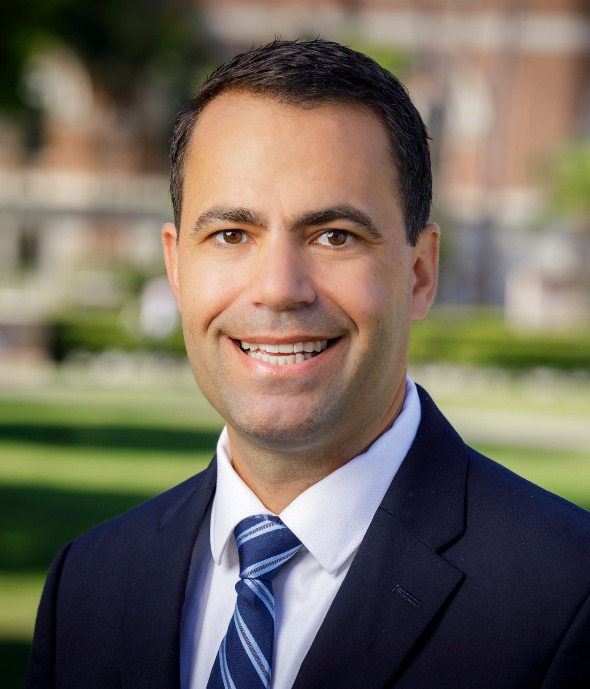
Quoted: Bobby Carnes in The Wall Street Journal
Carnes explains how AI construction costs can be an accounting “black box.”
Bobby Carnes specializes in financial reporting and auditing, with a specific focus on mergers and acquisitions, financial disclosure, and the accounting labor market. His research has been published in leading academic journals such as the Journal of Accounting Research, Review of Accounting Studies, and The Accounting Review. Additionally, his research has been noted by the Securities and Exchange Commission in their policymaking process and has been featured in media and professional outlets such as Barron's, Thomson Reuters, CFO.com, Harvard Law School's Forum on Corporate Governance & Financial Regulation, and Columbia Law School's Blue Sky Blog.
Carnes received his PhD from Penn State and is a Certified Public Accountant. Prior to beginning his academic career, Carnes worked as an internal audit manager for Interval Leisure Group (NASDAQ: ILG) and as a senior associate in Ernst & Young's advisory services group.

Areas of Expertise
Departments
INSIGHT + ANALYSIS
The latest interviews, quotes, citations, and research in the media.
Quoted: Bobby Carnes in The Wall Street Journal
Carnes explains how AI construction costs can be an accounting “black box.”
Research: Bobby Carnes in Barron’s
With more people investing portions of their paycheck into the stock market, Carnes’ research finds that five-friday months create a disproportionate influx of money into the market.
NEWS + EVENTS
New Study Explores How Monthly Income Fluctuations Drive Up Mutual Fund Costs
A new study examines how variations in monthly paychecks can put a strain on mutual fund managers and result in lower fund returns.
Marshall Faculty Publications, Awards, and Honors: December 2024 and January 2025
We are proud to highlight the many accomplishments of Marshall’s exceptional faculty recognized for recently accepted and published research and achievements in their field.
For a list of recent faculty promotions, please visit here.
Marshall Faculty Publications, Awards, and Honors: November 2024
We are proud to highlight the many accomplishments of Marshall’s exceptional faculty recognized for recently accepted and published research and achievements in their field.
USC Marshall Welcomes 21 New Faculty
These faculty bring their varied expertise into the classroom, with a mix of academia, research, and real-world experience.
RESEARCH + PUBLICATIONS
We show that shocks to household discretionary wealth, identified as months with five Fridays when bi-weekly and weekly paid workers receive an extra paycheck, are accompanied by higher retail mutual fund inflows and lower returns. These outcomes imply that household investors trade en masse with their wealth, which can cause funds to make costly portfolio adjustments. Consistent with retail investors driving the results, we use data from the Robinhood online brokerage platform and find that retail investors increase their stock holdings during these periods. We also find that during five Friday months, sentiment-based trading increases in retail mutual funds. Consistent with mutual funds mitigation of the shocks to fund flows, larger and more liquid funds performance is less affected. Collectively, we provide evidence that households trade in response to wealth shocks and this imposes real costs on mutual funds.
We investigate the efficacy of mandated public disclosure to improve firms’ trade credit payment practices. We exploit a regulation adopted by the United Kingdom in 2017 that mandates firms meeting certain size criteria to disclose information about their payment practices toward their trade suppliers. Using a difference-in-differences research design combined with a regression discontinuity approach for a sample of firms just above and below the mandatory disclosure size criteria, we find that firms disclosing supplier payment information reduce the number of days they take to pay their trade credit. Further, this effect is concentrated in firms with higher liquidity and lower leverage. After performing robustness tests, we explore two potential channels that could explain our findings. First, we consider whether firms are responding to pressure from suppliers in competitive industries. Second, we investigate whether firms are managing their external reputations. Using the Herfindahl-Hirschman Index to measure industry competitiveness, and firms that sell to end consumers and their market share to measure reputational exposure, we find evidence consistent with both explanations. Collectively, these findings suggest that disclosure motivates firms to improve their payment practices; however, this effect appears to be limited to firms with the financial flexibility to respond.
I investigate whether auditors engage in greater monitoring of acquirers during industrymerger waves. Merger waves are periods of industry transformation (i.e., disruption) thatare accompanied by greater uncertainty, limited internal and external corporate monitoring, and poorer acquisition performance. These factors threaten the quality of acquirers’financial reports. I test whether auditors respond to these periods by increasing their effort,which improves audit quality, and by resigning from high-risk engagements to reducetheir portfolio risk. For in-wave audits, I find that audit fees are higher, financial statements are less likely to be materially misstated, auditors are more likely to timely identifyand report internal control deficiencies, and auditor resignations are higher. Overall, thesefindings are consistent with auditors adapting to merger waves and providing higher-quality corporate monitoring within the scope of their influence. Importantly, this study provides insights that broaden our understanding of auditing and M&A transactions.
Regulation requires US public companies to disclose the pre-approval status of their year-end auditors in their annual proxy statements. Although auditor–client relationships remain at will, the disclosure mandate requires companies to publicly announce their intentions to retain their current auditors. In this paper, we provide initial evidence of the potential implications that these disclosures may have on financial reporting quality. We find that when the disclosures occur later relative to the release of interim reports, interim filings exhibit lower reporting quality. After performing robustness tests, we explore two possible mechanisms that could explain our findings. First, we consider the possibility that audit committee members compromise their independence. Second, we investigate whether auditors delay the performance of certain interim procedures while the disclosures are pending. With the use of audit committee equity compensation to measure audit committee independence impairment and audit fees to measure auditor effort, we find evidence consistent with both explanations.
This article explores the accounting labor shortage and its impact on financial reporting. It highlights the high demand for accountants in the government sector and the aging population of CPAs in the US. The article suggests various initiatives to address the shortage, such as promoting accounting as a career choice, reevaluating educational requirements for CPA licensure, and improving compensation and benefits for accountants. It also emphasizes the need to dispel negative stereotypes about the profession and attract students through expanded services and educational programs. The article acknowledges the challenges posed by the shortage and offers potential solutions to ensure the quality of financial reporting and the stability of the economy.
Financial statement fraud generates many negative effects, including reducing people's willingness to participate in the stock market. If it also stigmatizes accounting, it may similarly adversely affect the quantity and quality of workers willing to become accountants, thereby potentially creating negative effects for years to come. We examine the impact of fraud on the labor force entering the accounting profession, which is a key input into the production of accounting information (i.e., the output). Using data describing millions of college students across the United States, we find incoming students are actually more likely to major in accounting when local frauds occur during their formative years. These students are also more likely to have attributes desired by the accounting profession (e.g., high academic aptitude) and are more likely to subsequently serve in public accounting and become Certified Public Accountants. In the context of other fields (i.e., all college majors), we find that fraud similarly spurs interest in other business disciplines, but not in majors outside of business schools. Those attracted to other business disciplines, however, generally possess different traits. Specifically, students entering accounting are distinctively more likely to exhibit values espoused by the accounting profession, including a predisposition to public service and less commercial orientation. Thus, nonpecuniary motives appear to uniquely drive accounting student enrollment following fraud. Collectively, our findings suggest that, while fraud is unmistakably bad, it appears to have the positive unintended consequence of attracting labor into business disciplines and, in accounting, increasing the prevalence of desirable traits among entrants.
Because internal control audits never existed before the passage of the Sarbanes-Oxley Act (SOX), and these audits simultaneously became mandatory for all U.S. accelerated filer companies, it has been difficult to assess the extent of investor demand for these audits. To understand whether investors demand internal control audits for these large companies, we exploit a regulatory exemption that permits companies to exclude acquired operations from an internal control audit. Using this voluntary setting, we find that investors react negatively if a company excludes acquired operations from their internal control audit. This negative reaction is larger when more of the company's operations are excluded from audit and when there is greater information uncertainty. Further, companies that exclude acquired operations from internal control audits are more likely to have a subsequent restatement. Collectively, these findings are consistent with investors perceiving value in (i.e., demanding) internal control audits for large U.S. public companies.
COURSES